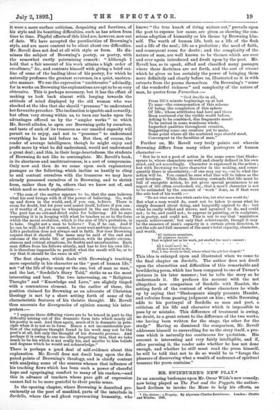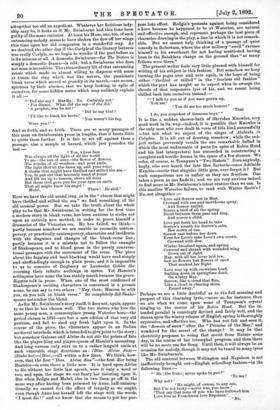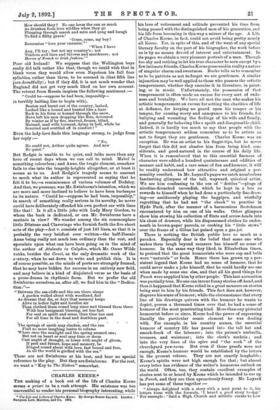MR. SWINBURNE'S NEW PLAY.* •
Ix an amusing burlesque upon Mr. Oscar Wilde's new comedy, now being played as The Poet and the Puppets, the author- bard declines to invoke the Muse to help his efforts, as • The Sisters : a l'ragedy. By Algernon Charles Swinbnrne . London Matto and Windus. 1892.
altogether too old an expedient. Whatever her fictitious lady- ship may be, it looks as if Mr. Swinburne had this time been guilty of the same omission. At least his Muse, one, too, of such entrancing melody, seems to have shaken the dew off her wings this time upon her old companion in a wonderful way. As we doubted the other day if the Carlyle of the literary lectures
was really Carlyle, so we begin to wonder if the poet before us is Swinburne at all. A domestic Swinburne—for The Sisters is
simply a domestic drama—is odd ; but a Swinburne who does not scan is incredible. The extraordinary lilt of that entrancing music which made us almost willing to dispense with sense at times, the ring which was like nature, the passionate blank verse which moved so grandly in its march,—are so con.
spicuous by their absence, that we keep looking, in spite of ourselves, for some hidden metre which may suddenly explain it all :—
" Did she say ? Hardly. No. Certainly not.'
For dinner. What did she say—if she did.' 'A prophet, was he not ? '
'Did he say that ?
I'd like to black his boots.' You weren't his fag, Were you ? ' "
And so forth, and so forth. There are so many passages of this most un-Swinburnian prose in lengths, that it boots little to quote them further. It is fair to set off against them a passage, also a sample at hazard, which just precedes the last :—
" You, whose face Was always all the light of all the world To me—the sun of suns—the flower of flowers, The wonder of all wonders—and your smile The light that lit the dawn up, and your voice
A charm that might have thrilled and stilled the sea—
You, to put out that heavenly hand of yours And lift me up to heaven, above all stars
But those God gave you for your eyes on earth
That all might know his angel !
Mabel. There ! Be still."
Here we have the old sound ring, as in the "charm that might have thrilled and stilled the sea" we find something of the old musical power. But we take the truth about the whole play to be that Mr. Swinburne, in writing for the first time a modern story in blank verse, has been anxious to strike out upon an entirely new method, in order to prove himself a dramatist of the Victorian era. He has failed, we think,— partly because somehow we are unable to reconcile contem- porary, or practically contemporary, characters and incidents, with the disguises and changes of the blank-verse line ; partly because it is a mistake not to follow the example of Shakespeare, and to blend prose in the purely conversa- tional passages with the movement of the verse. The piece about the fagging and boot-blacking would have read simply and unoffendingly enough in plain prose, and it is impossible to us to conceive of Dogberry or Launcelot Gobbo dis- coursing their infinite nothings in metre. Yet Hamlet's soliloquies have none the less stately march because the grave- diggers talk in prose. When one of the most confirmed of Shakespeare's reciting characters is concerned in a prosaic scene, he can say to two others : "Nay, then ; Heaven be with
you, an you talk in blank verse." So completely did Shake- speare naturalise the blend.
As for Mr. Swinburne's story itself, it does not, again, appear to us that he has chosen well. The two sisters who love the same young man, a commonplace young Waterloo hero—the period chosen is 1816—are but a new edition of that very old position, and fail to shed any fresh light upon it. In the course of the piece, the characters appear in an Italian mediwval interlude, which is intended to give point to the story ; but somehow Galasso and Alvise do not stir the pulses of fate like the player-king and player-queen of Hamlet's mousetrap. And long custom only stirs us to a rather languid smile at
such venerable stage directions as : (Dies. Alvise dies)— (Stabs her)—(Dies),—all within a few lines. We think, how-
ever, that the first "Dies. Alvise dies "—the first dier being Beatrice—is even there a little new. It is hard upon Alvise to die without her little last speech, were it only a word or two, and upon the stage we can fancy her insisting upon it. But when Redgie and Mabel, also in two lines, go off in the same way after having been poisoned by Anne, half-uninten- tionally, we cannot feel the effect of tragedy as we ought, even though Anne has herself left the stage with the words, "I must die ! " and we know that she means to put her pur- pose into effect. Redgie's protests against being considered a hero because he happened to be at Waterloo, are natural and effective enough, and represent perhaps the best piece of character-drawing in the play, a line in which it is not remark- able. But we cannot help thinking of a passage of quiet comedy in Robertson, where the slow military "swell" excuses himself to his sweetheart for not having mentioned having been in the Balaklava charge on the ground that "so many fellows were there."
The present writer feels very little pleased with himself for writing of his subject in this fashion. But somehow we keep turning the pages over and over again, in the hope of being either "thrilled or stilled" in the "fearless old fashion" which the poet has taught us to expect when he sweeps the chords of that responsive lyre of his, and we resent being chilled back into ourselves instead :-
" I talk to you as if you were grown up,
You see.' You do me too much honour.' That I do, you stupidest of tiresome boys.'"
It is like a sudden shower-bath of Sheridan Knowles, very good work in its way—indeed, it is possible that Knowles is the only man who ever dealt in verse of this kind successfully —but not what we expect of the singer of _Atalanta in Calydon. It is all out of drawing, somehow ; while the sub- ject rather perversely recalls the one remarkable ballad in
which the most undramatic of poets (in spite of Robin Hood and his last interpreters) has succeeded in constructing a complete and terrific drama in the space of a few stanzas. We refer, of course, to Tennyson's "Two Sisters." Does anybody, haply, who ever heard the late Mrs. Sartoris—once Adelaide Kemble—recite that singular little gem, ever forget it ? But such comparisons are as unfair as they are fruitless. One takes a poem as one finds it ; and we are very anxious indeed to find more in Mr. Swinburne's latest venture than we can. Is this another Waterloo failure, to rank with Walter Scott's ?
No, not altogether :—
"Love and Sorrow met in May,
Crowned with rue and hawthorne spray, And Sorrow smiled.
Scarce a bird of all the spring Durst between them pass and sing, And scarce a child.
Love put forth his hand to take Sorrow's wreath for Sorrow's sake, Her crown of rue.
Sorrow cast before her down Even for Love's sake Love's own crown, Crowned with dew.
Winter breathed again, and spring Cowered and shrank with wounded wing Down out of sight.
May, with all her loves laid low, Saw no flowers but flowers of snow That mocked her flight.
Love rose up with crownless head, Smiling down on springtime dead, On wintry May.
Sorrow, like a cloud that flies, Like a cloud in clearing skies, Passed away."
Perhaps we are a little doubtful as to the full meaning and purport of this charming lyric,—more so, for instance, than
we are when we come upon some of Tennyson's crystal singing in the course of his Robin. Hood. But the in-
tended parallel is cunningly devised and fairly writ, and the stanza upon the wintry relapse of English spring is thoroughly expressive, and effective too. Who has not felt and seen it, the "flowers of snow" after the "Promise of the May," and wondered for the secret of the change ? It may be that electricity proposes to wring that secret from Nature some day, in the course of her triumphal progress, and then there will be no more use for Song. Until then, it will always be an occasion for melody, though it may not be tuned to many lyres like Mr. Swinburne's.
The old contrast between Wellington and Napoleon is not ineffectively brought out—English schoolboy fashion—in the following lines :—
" He [the Duke] never spoke to you ? '
To me ?
Why not ? ' He might, of course, to any one, But I'm not lucky—never was, you know.' They say that none of you who have followed him Love him as Frenchmen love Napoleon.' No.
How should they ? No one loves the sun as much As drunken fools love wildfire when they go Plunging through marsh and mire and quag and haugh To find a filthy grave.' Come, come, my boy !
Remember "love your enemies."' 'When I have Any, I'll try; but not my country's ; not Traitors and liars and thieves and murderers ; not
Heroes of French or Irish fashion: " Poor old Ireland ! We suppose that the Wellington boys really did talk rather like that, though we could wish that in blank verse they would allow even Napoleon his full four syllables, rather than three, to be scorned in (that fifth line jars dreadfully).; but if they did, it is not much wonder that England did not get very much liked on her own account. The retreat from Russia inspires the following sentiment :— " Could he—suppose he had been, impossibly—
(a terribly halting line to begin with), Beaten and burnt out of the country, lashed, Lashed like a hound and hunted like a hare Back to his form or kennel through the snow, Have left his men dropping like flies, devoured By winter as if by fire, starved, frozen, blind, Maimed, mad with torment, dying in hell, while he Scurried and scuttled off in comfort P" Even the lady-love finds this language strong, to judge from her reply :— "No, He could not, Arthur quite agrees. And now Be quiet."
But Redgie is unable to be quiet, and talks more than any hero of recent days whom we can call to mind. Mabel is something colourless ; and Anne, the tragic element, somehow fails to rise into the tragedy-heights altogether, or at least it seems so to us. And Redgie's tragedy seems to amount to much what its author is represented as saying that he felt it to be,—a reminiscence of various volumes of Dodsley. And that, we presume, was Mr. Swinburne's intention, which we are more and more inclined to believe to have been burlesque in its nature. "Could he—suppose he had been, impossibly," in search of something really serious in its novelty, he never could have deliberately offended his own perfect ear with lines like that ! Is it all a little joke with Lady Mary Gordon, to whom the book is dedicated, or can Mr. Swinburne have a matinee in view ? We wander among the six commonplace little Dilstons and Claverings who furnish forth the five short acts of the play—Act v. consists of just 143 lines, so that it is probably the very briefest ever written—the half-Ibsenic Anne being really not much less ordinary than the rest, and 'speculate upon what can have been going on in the mind of the author of Atalanta in Calyclon, which Mr. Oscar Wilde ranks, besides the Cen,ci, as the only dramatic work of the 'emtury, when he sat down to write and publish this. It is of course possible, as the minds of poets are strangely framed, that he may have bidden for success in an entirely new field, and may believe in a kind of disjointed verse as the basis of a prose-drama in rhythmic form. But we prefer the old Swinburne ourselves, as, after all, we find him in the "Dedica- tion :"—
" Between the sea-cliffs and the sea there sleeps A garden walled about with woodland, fair As dreams that die, or days that memory keeps Alive in holier light and lovelier air
Than clothed them round long since and blessed them there
With less benignant blessing, set less fast For seal on spirit and sense, than time has cast For all time in the dead and deathless past.
The springs of earth may slacken, and the sun Find no more laughing lustre to relnme Where once the sunlight and the spring seemed one; But not on heart or soul may time or doom Cast aught of drought, or lower with aught of gloom, If past and future, hope and memory, be Ringed round about with love, fast bound and free, As all the world is girdled with the sea."
These are not Swinburne at his best, and bear no special reference to the play. But they are Swinburne. For the rest, we want a "Key to The Sisters" somewhat.












































 Previous page
Previous page